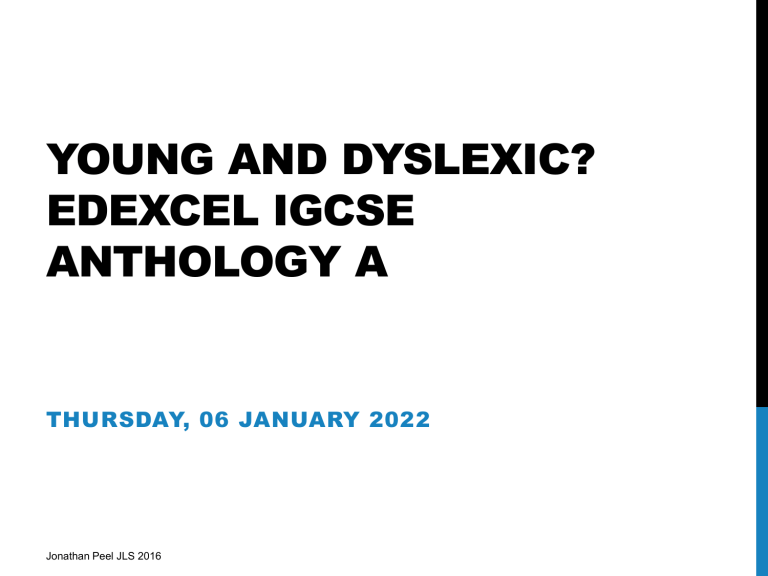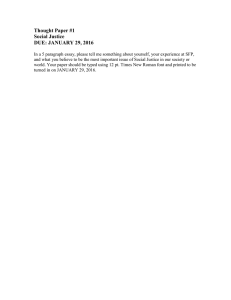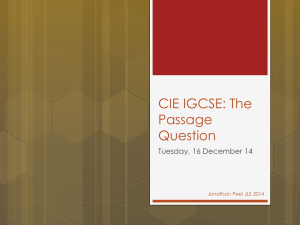
YOUNG AND DYSLEXIC? EDEXCEL IGCSE ANTHOLOGY A THURSDAY, 06 JANUARY 2022 Jonathan Peel JLS 2016 BENJAMIN ZEPHANIAH Contexts: Use your devices: 5 minutes to find all you can about Zephaniah! You might want to start here: http://benjaminzephaniah.com/ Then answer these questions: How old was he when he was thrown out of school? In what year did this happen? What infamous speech was made in 1968 in Wolverhampton? How may this have impacted his early life and how is it reflected in the attitudes shown in the article? Jonathan Peel JLS 2016 THE ARTICLE From The Guardian Online – internet site of major broadsheet paper. Generally perceived as Left Wing. Highly inclusive and supportive of minority voices Adapted from a book in which famous people share their experiences of Dyslexia Who might wish to read This book, and why? What would be the purpose Of publishing this book? Jonathan Peel JLS 2016 THE WRITING As a child I suffered, but learned to turn dyslexia to my advantage, to see the world more creatively. We are the architects, we are the designers. I’m of the generation where teachers didn’t know what dyslexia was. The big problem with the education system then was that there was no compassion, no understanding and no humanity. I don’t look back and feel angry with the teachers. The ones who wanted to have an individual approach weren’t allowed to. The idea of being kind and thoughtful and listening to problems just wasn’t done: the past is a different kind of country. Let’s discuss the ideas I have underlined. Jonathan Peel JLS 2016 idea Comment effect “I suffered” Uses emotive verb at opening – possibly suggests physical abuse Engages sympathy – no child should suffer. Honesty and frankness estabished I Immediate and repetitive use of 1st person – will pluralise and use 2nd sparingly Honest, vivid, engages with reader as a “team” when needed – sharing experience “but turned… to my advantage Introduces negative idea and then looks ot the poisitive Establishes the idea that however bad things look, it is possible to make them into benefits No compassion, no understanding, no humanity / being kind, thoughtful and listening to… Triplet idea. Used sparingly so important to note when it does appear. Triplets draw attention to an idea and emphasise the importance. The negative first triplet is very powerful for the repeated sense of frustration created. The past is a different kind of country Intertextuality: The Go Between by LP Hartley. Full quotation drops “kind of” and adds: They do things differently there. If we know the whole quotation we know that things have changed for the better. Also establishes Zephaniah’s intellectual credibility Jonathan Peel JLS 2016 PULLING STRANDS TOGETHER Zephaniah writes in the first person and suggests honesty and frankness He mixes INFORMATION text such as Paragraph 1 with EXPLANATION such as found in Paragraph 2. He also DESCRIBES his school days vividly. He offers ADVICE a the end of the passage Looking at Paragraphs 3-6, what feature of the writing makes this description especially vivid. How likely is it that this is accurately recalled after nearly 50 years? How does Zephaniah make the teacher’s response in paragraph 4 particularly upsetting? Jonathan Peel JLS 2016 A LONG PASSAGE You will not have time to write in detail about the whole passage, citing every paragraph. So far we have looked at the opening and how it creates mood. We have also looked at Zephaniah’s use of Direct Speech to create emotional impact for the reader – think about the purpose of the passage: will readers generally recognise his experience? The next focus will be structure: Jonathan Peel JLS 2016 STRUCTURE What do we call this kind of temporal structure? It moves through the story in the logical order of events. List the major events in Zephaniah’s life which he recounts here: school, borstal…. How do you respond to someone who is being this open about their past – when it contains much which is not seen as “good”? How does the structure relate to the idea we discussed in the opening sentence? (“but…”) Jonathan Peel JLS 2016 “A HIGH PERCENTAGE OF THE PRISON POPULATION ARE DYSLEXIC, AND A HIGH PERCENTAGE OF THE ARCHITECT POPULATION.” What surprises you about this statement that is made in paragraph 9? Why do you think Zephaniah chooses to open the paragraph with this statement? What sort of discussion does it prepare the readers for? Where else in the passage does Zephaniah make a direct link between Dyslexia and creativity as well as Dyslexia and negativity? Which pairing is the dominant feature of the writing? Jonathan Peel JLS 2016 TENSE The chronology reaches the present day. What happens to the tense in paragraph 13 which reflects this? In what way would you support the idea that from this point the writing is much more positive? How does Zephaniah ensure tha this readers fell that he is talking directly to them? What elements of the content would allow the readers to feel that they share the experience with Zephaniah? What is the intended effect in the short paragraph 15? How is it achieved? Jonathan Peel JLS 2016 COLLOQUIAL LANGUAGE Zephaniah is famed for poetry which used natural speech rhythms and patterns – writing in the Vernacular. Occasionally this passage is allowed to reflect the natural speech patterns of many of his readers – he uses colloquialisms – “don’t be heavy on yourself”, “kids”. What is the effect of this? Jonathan Peel JLS 2016 DEFIANCE Can you find evidence to suggest that Zephaniah is being defiant and trying to engage his fellow dyslexics and standing up to the rest of society? Look at the last 5 paragraphs if you are stuck. Jonathan Peel JLS 2016 Offers advice to sufferers and to parents. Short sentences CLOSING COMMENTS 2p addresses parents and builds positivity So don’t be heavy on yourself. And if you are a parent of someone with dyslexia don’t think of it as a defect. Dyslexia is not a measure of intelligence: you may have a genius on your hands. Having dyslexia can make you creative. If you want to construct a sentence and can’t find the word you are searching for, you have to think of a way to Collo write round it. This requires being creative and so your ‘creativity muscle’ gets bigger. q. lang Kids come up to me and say, ‘I’m dyslexic too,’ and I say to them, ‘Use it to your Info: short sentence and explain longer advantage, see the world differently. Us dyslexic people, we’ve got it going on – we are the architects. We are the designers.’ It’s like these kids are proud to be like me and if that helps them, that is great. I didn’t have that as a child. I say to them, ‘Bloody nondyslexics … who do they think they are?’ Sentence is informal – like a conversation colloquial Jonathan Peel JLS 2016 1st plural to establish unity Humour in defiance – positive tone.

